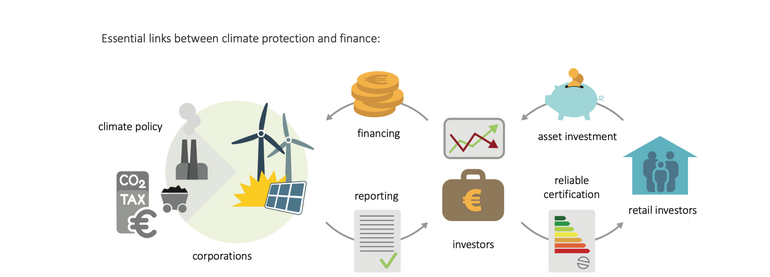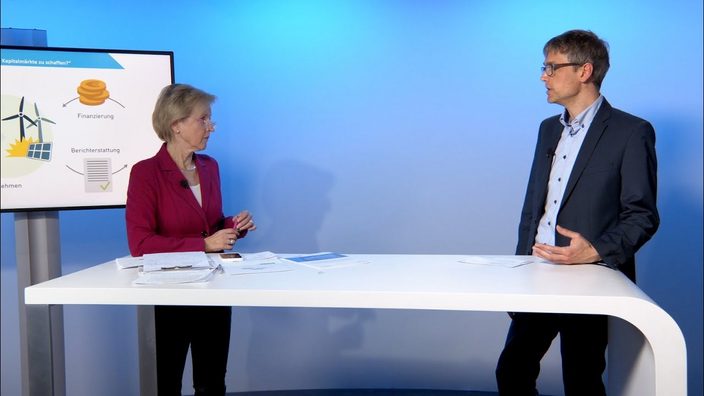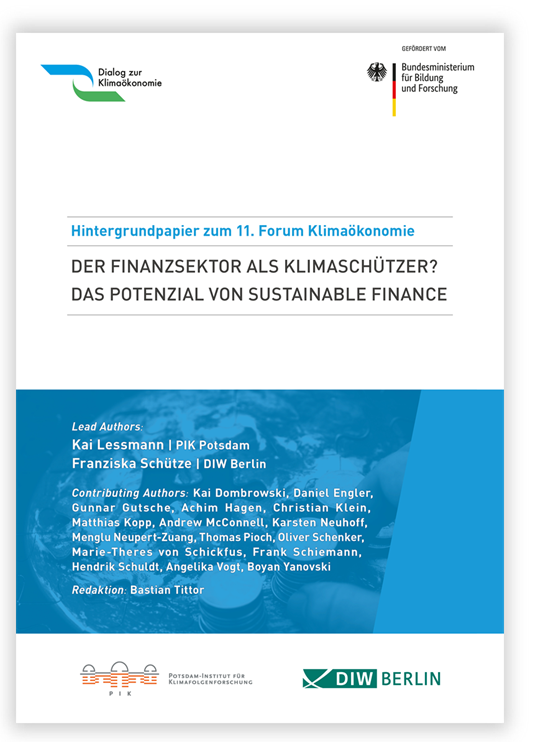Forum Climate Economics 11
The Financial Sector as Climate Protector? The Potential of Sustainable Finance
Virtual Forum Climate Economics 11 on Sustainable Finance brings together voices from research, politics and business

ESG, green bonds or taxonomy act – as a non-expert, it is easy to lose the overview of the abbreviations and technical jargon in the world of sustainable finance, says moderator Conny Czymoch at the start of the Forum Climate Economics 11. Reason enough for the last forum of the Dialogue on the Economics of Climate Change to address the question of the role that the financial sector can play in mitigating climate change. What criteria must the reporting of companies in the financial and real economy fulfill in order to sufficiently take climate and transition risks into account? Does disclosure of sustainability information automatically lead to the intended reallocation of capital flows? Are there other barriers to making the necessary investments in green technologies? Answers to these and other questions were hoped for by some 190 participants who followed the 11th Forum via the interactive event platform.
Climate-friendly Technologies are in Particular Depend on Low Cost of Capital
Energy finance expert Prof. Dr. Bjarne Steffen (ETH Zurich) offered a scientific perspective on the challenges of financing climate-friendly technologies. The need for investment in the energy sector in the EU, which is increasing by 30-40 % annually, is explained on the one hand by the high costs of converting the necessary energy infrastructure, and on the other hand by the high capital intensity of low-CO2 technologies.
Although there is no shortage of available capital in Europe, many investors are reluctant to invest because of existing uncertainties - for example, in hydrogen as an energy carrier. In order to strengthen the financing of climate-friendly technologies on a broad scale, a green financial policy could take various measures: A reduction in the cost of capital is expected to favor investments in renewable energies. In addition to the general level of interest rates, key drivers of capital costs are technology-specific interest margins and expected returns, as well as emissions trading schemes. Market initiatives, such as the divestment activities of public pension funds or special support programs of state-owned investment banks, also have an influence on the cost of capital.
Sustainable Finance: not a Green Finance Sector, but a Sustainable Finance System
Kristina Jeromin, Co-Chair of the Cluster for Green and Sustainable Finance Germany, presented a multi-layered picture of sustainable finance. Sustainable Finance is much more than the promotion of sustainable financial products. The goal is a sustainable financial system that supports people and companies in the necessary transformation process.
Germany has set the ambitious goal of becoming "a leading location for sustainable finance", but has so far failed to implement the necessary measures to achieve this goal. Besides a high level of ambition, this also requires transparency in the financial system and in financing mechanisms. Kristina Jeromin urged the players in the financial sector to see sustainability not as a niche, but as a systemic field of work. Only in this way, she said, could the sector achieve the innovations needed for change, for example in the area of digital recording and processing of sustainability information. Jeromin expressed criticism towards the current debate surrounding the EU taxonomy, saying that it was diverting the financial sector from its suggested systemic path.
Experts report on exchange between science and praxis in preceding Virtual Roundtable Series
Following the two keynotes, Dr. Kai Lessmann, Dr. Franziska Schütze and Dr. Gunnar Gutsche reported on the series of roundtable discussions attended by about 20 participants each, which had taken place on February 23, February 24 and March 2 on various topics of the background paper for the Forum Climate Economics 11. In their interviews, they briefly presented key results and insights from the discussions:

Panel discussion: What can the financial sector contribute to climate protection?

In the final panel discussion, keynote speakers Bjarne Steffen and Kristina Jeromin were joined by representatives from the financial sector and the manufacturing industry. Head of Sustainability at the capital management company BayernInvest, Wiebke Merbeth pointed out at the beginning that existing political uncertainties require an even stronger dialog between all stakeholders involved. Christoph Reißfelder, energy and climate policy expert at the chemical company Covestro, also considers the simultaneous change in political and macroeconomic conditions to be a very big challenge for the preparation of long-term investment plans. Here, he sees a close link between companies in the financial and real economy, which requires mutual trust in possible transformation paths.
State support, for example in the form of public-private partnerships, can be a valuable instrument for achieving progress in terms of sustainability. One example, Reißfelder added, is the establishment of circular production processes, the costs of which are still substantial. He was supported in his view by Bjarne Steffen, who believes that the greatest challenge lies in the transformation of industries for which no competitive alternative processes or technologies are yet available. In this context, Steffen said, it is also necessary to build up expertise within the financial sector in order to be able to adequately solve these industry-specific challenges. All panelists were optimistic about the prospects for success of the necessary economic transformations. Even if this change is sometimes unpleasant and uncomfortable, they believe that the players in their industries are on the right track.
Background Paper
The established goal of climate neutrality requires rapid decarbonization of the economy. Both in Germany and in the European Union, the financial sector is seen as playing an increasingly important role in achieving this goal. This background paper provides an overview of the fields of action, actors and measures associated with the term "sustainable finance". It looks in more detail at the levers that control how investors or capital markets decide whether to invest in low-emission activities or to withdraw from emissions-intensive activities, and at the framework conditions needed to enable different groups of investors to make well-informed decisions.






